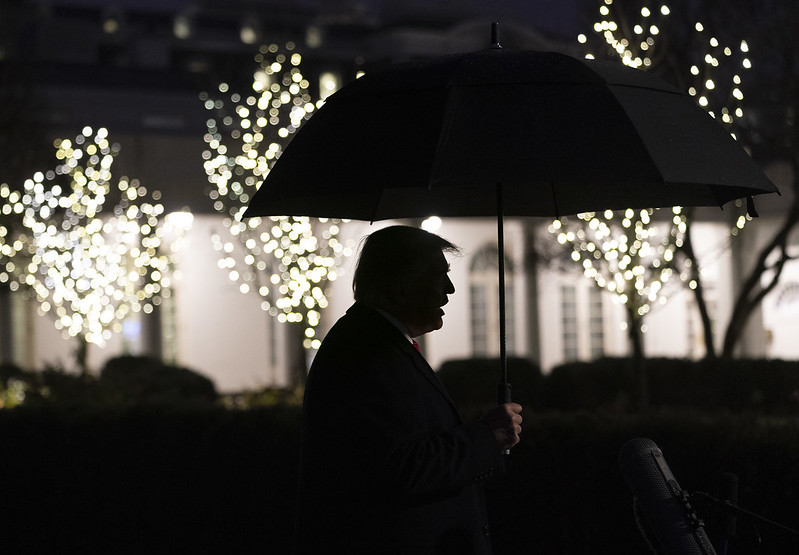Trump Litigation Round Up
An overview of cases in which government officials are seeking information regarding the president—specifically, Trump’s financial records and tax returns, witness testimony, and the Mueller report grand jury material.

Published by The Lawfare Institute
in Cooperation With

As the country’s attention has turned to the ongoing impeachment proceedings, a series of lawsuits in which President Trump and his administration assert broad claims of executive privilege have continued to progress through the court system. Some of these cases could have immediate consequences for the records and witnesses available to Congress for impeachment, while others could reveal financial information on Trump in the lead-up to the 2020 election. But keeping track of all of these cases can be a struggle, which is why we gathered just the essential procedural facts here. We focused on cases in which government officials seek information regarding Trump and divided them into three categories: Trump’s financial records and tax returns, witness testimony, and the Mueller report grand jury material.
First, a note on the Supreme Court calendar: The justices’ next conference, at which they vote on new cases to hear, will be held on December 13. Currently, three of these cases could be taken up by the court at this December meeting: the New York grand jury case seeking tax returns, the House subpoena seeking records from Mazars, and the House subpoena seeking records from Deutsche Bank and Capital One Bank. If the justices take up a case or cases at the December meeting, a decision would likely not be issued until late June at the earliest based on the time it takes to brief, argue and decide such cases.
- Financial Records and Tax Returns
Donald J. Trump, et al. v. Mazars USA, LLP & Committee on Oversight and Reform of the U.S. House of Representatives
President Trump brought suit against Mazars, his longtime accounting firm, to prevent it from turning over his personal financial information to the House Committee on Oversight and Reform. Trump’s legal team argued that the House exceeded its legitimate legislative authority in issuing the subpoena, while the committee argued that, among other things, it needs these records to determine if government disclosure laws should be changed.
- April 15, 2019 – Committee issues subpoena to Mazars.
- April 22, 2019 – President Trump files complaint.
- May 20, 2019 – Judge Amit P. Mehta of the U.S. District Court for the District of Columbia (DDC) denies Trump’s motion for preliminary injunction, entering summary judgment in favor of the committee.
- October 11, 2019 – U.S. Court of Appeals for the D.C. Circuit affirms district court’s grant of summary judgment, holding the committee “possesses authority under both the House Rules and the Constitution to issue the subpoena.” Judge Neomi Rao dissents, insisting that the committee “seeks to determine whether the President broke the law, but it has not invoked Congress’s impeachment power to support this subpoena.”
- November 25, 2019 – Supreme Court grants stay pending certiorari petition.
- December 4, 2019 – President Trump’s legal team files certiorari petition.
- December 13, 2019 – Supreme Court could determine whether to hear case.
Donald J. Trump v. Cyrus R. Vance, Jr. & Mazars USA, LLP
President Trump sued to enjoin the enforcement of a grand jury subpoena issued by New York District Attorney (NY DA) Cyrus Vance to Trump’s accounting firm, Mazars, asserting an expansive claim of absolute immunity from criminal process of any kind.
- August 29, 2019, – NY DA serves subpoena on Mazars.
- September 19, 2019 – President Trump files complaint.
- October 7, 2019 – Judge Victor Marrero of the U.S. District Court for the Southern District of New York (SDNY) rules in favor of NY DA. While dismissing the complaint pursuant to Younger v. Harris, he rules in the alternative that the president is not entitled to injunctive relief, rejecting the president’s broad immunity claims: “This court finds aspects of such a doctrine repugnant to the nation’s governmental structure and constitutional values.”
- October 7, 2019 – U.S. Court of Appeals for the 2nd Circuit grants temporary stay pending review.
- November 4, 2019 – 2nd Circuit vacates dismissal on Younger abstention grounds but affirms district court’s ruling on the immunity question, stating that “any presidential immunity from state criminal process does not extend to investigative steps like the grand jury subpoena at issue here.”
- November 14, 2019 – President Trump’s legal team files certiorari petition.
- November 21, 2019 – NY DA files brief in opposition.
- December 13, 2019 – Supreme Court could determine whether to hear case.
Donald J. Trump et al v. Deutsche Bank AG, Capital One Financial Corp.; Committee on Financial Services of the U.S. House of Representatives, Permanent Select Committee on Intelligence of the U.S. House of Representatives
President Trump sued Deutsche Bank and Capital One Bank to prevent their compliance with subpoenas issued by the House Financial Services and Intelligence Committees for financial records of President Trump, his adult children and his businesses.
- April 11, 2019 – Committees serve subpoenas on Deutsche Bank and Capital One Bank.
- April 29, 2019 – President Trump files complaint.
- May 22, 2019 – SDNY Judge Edgardo Ramos, ruling from the bench, denies Trump’s motion for preliminary injunction.
- December 3, 2019 – 2nd Circuit affirms Ramos’s ruling, finding the committees had lawful purposes for seeking the records but orders a few limited exceptions to prevent disclosure of sensitive personal information. Judge Debra Ann Livingston dissents in part, raising separation-of-powers concerns with the breadth of the subpoenas.
- December 6, 2019 – Supreme Court grants stay pending certiorari petition.
- December 13, 2019 – Supreme Court could determine whether to hear case.
Donald J. Trump v. Committee on Ways and Means, et al
President Trump sued to bar the House Committee on Ways and Means from obtaining his state tax returns using the New York TRUST Act, a state law that gave Congress the right to obtain tax information of New York residents. At this time, none of the committees that could obtain President Trump’s tax returns under this new state law has actually invoked it to do so.
- November 11, 2019 – DDC Judge Carl J. Nichols dismisses case, finding there was no conspiracy between the committee and New York state officials; therefore, the D.C. court has no personal jurisdiction. Judge Nichols notes Trump could renew his claim if a committee were to invoke the law in seeking to obtain his tax records.
Committee on Ways and Means, U.S. House of Representatives v. U.S. Dep’t of the Treasury, Internal Revenue Service, Steven T. Mnuchin, Charles P. Rettig
The House Committee on Ways and Means sued the Treasury Department, IRS, Treasury Secretary Steven T. Mnuchin and IRS Commissioner Charles P. Rettig for refusal to produce tax return information regarding President Trump. The committee contended this was a valid oversight request pursuant to Section 6103(f) of the Internal Revenue Code, 26 U.S.C. § 6103(f), which requires that the Treasury “shall furnish” the committee with “any” requested tax return
information. The defendants objected to “the Committee’s attempt to enlist the Judiciary on its side of this inter-branch dispute.”
- April 3, 2019 – Committee requests President Trump’s tax return information.
- May 10, 2019 – After Treasury and IRS refuse to comply, the committee serves subpoenas on Mnuchin and Rettig.
- July 2, 2019 – Committee files complaint.
- September 6, 2019 – Treasury, IRS, Mnuchin and Rettig move to dismiss case.
- September 23, 2019 – Committee files motion in opposition.
- November 6, 2019 – Hearing on motion to dismiss held; case is pending before DDC Judge Trevor N. McFadden.
- Witness Testimony
Committee on the Judiciary, U.S. House of Representatives v. Donald F. McGahn II
The Justice Department, representing former White House Counsel Donald F. McGahn II, sought to block a congressional subpoena for McGahn’s testimony, arguing that presidential advisers are absolutely immune from compelled testimony regarding their official duties.
- April 22, 2019 – Committee issues subpoena to McGahn.
- May 20, 2019 – President Trump directs McGahn not to appear before the committee.
- August 7, 2019 – Committee files complaint.
- November 25, 2019 – DDC Judge Ketanji Brown Jackson upholds congressional subpoena, applying the Miers precedent to find that McGahn, as a senior-level presidential aide, does not have absolute immunity from compelled congressional process and “must appear before the Committee to provide testimony, and invoke executive privilege where appropriate.”
- December 2, 2019 – DDC Judge Jackson denies DOJ’s request for stay pending appeal.
- January 3, 2020 – D.C. Circuit will hear oral argument in case.
Charles M. Kupperman v. U.S. House of Representatives; Donald J. Trump; Nancy Pelosi; Adam Schiff; Eliot L. Engel; Carolyn B. Maloney
The House subpoenaed Charles Kupperman to appear on Oct. 25. White House Counsel Pat Cipollone instructed him not to comply, arguing senior presidential advisers have absolute immunity from compelled congressional testimony regarding their official duties. Kupperman sued both the House and the president asking the court to determine whether he must testify.
- October 25, 2019 – Kupperman files complaint.
- November 6, 2019 – House withdraws subpoena and moves for dismissal of case.
- November 8, 2019 – Acting White House Chief of Staff Mick Mulvaney attempts to intervene in suit unsuccessfully.
- November 27, 2019 – Kupperman moves to add Sergeant-at-Arms Paul Irving as a co-defendant.
- December 10, 2019 – DDC Judge Richard J. Leon fast-tracks suit for final argument.
- The Mueller Report Grand Jury Material
In re Application of the Committee on the Judiciary, U.S. House of Representatives, for an Order Authorizing the Release of Certain Grand Jury Materials
The House Judiciary Committee, pursuant to Federal Rule of Criminal Procedure 6(e)(3)(E)(i), sought access to secret grand jury material underlying the Mueller report that was withheld from Congress by the attorney general. The Department of Justice argued that existing law barred disclosure of grand jury information to Congress, but the committee argued that the ongoing impeachment inquiry fit this case under precedent that permitted lawmakers access to grand jury material in the impeachment of President Nixon.
- July 26, 2019 – The committee submits application for grand jury material pursuant to Rule 6(e).
- October 25, 2019 – DDC Chief Judge Beryl Howell grants application of the House committee, finding the House impeachment inquiry legitimate and that a House resolution was not required to initiate such an inquiry.
- November 18, 2019 – D.C. Circuit grants stay of DDC ruling pending argument.
- January 3, 2020 – D.C. Circuit will hear oral argument in case.





